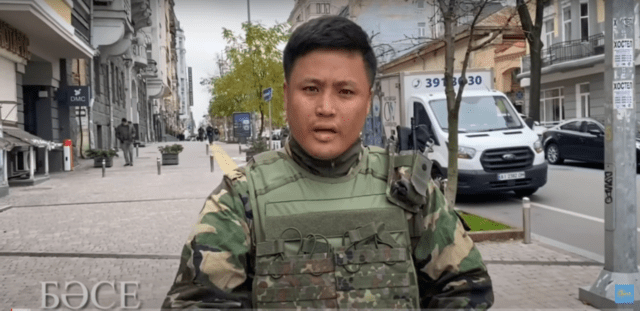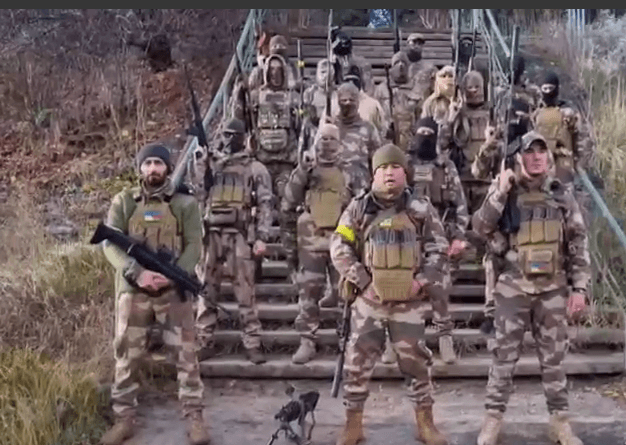Established the Turkic ‘Turan Battalion’ in Ukraine to fight against Russian armed forces

Geopolitical Report ISSN 2785-2598 Volume 25 Issue 4
Author: Giuliano Bifolchi
The creation of the Turan Battalion confirmed that the Ukraine conflict had become the perfect battleground for international fighters and contractors united by the desire to fight against the Russian Federation and promote their ideologies and goals.
On November 20th, 2022, Kazakh oppositionist Aidos Sadykov through his Telegram Channel BASE, announced the creation of the Turkic battalion ‘Turan’ in Ukraine. As declared in a video interview with Sadykov, the Kyrgyz citizen Almaz Kudabek was appointed commander of the Turan Battalion.
During the video, the commander confirmed that the battalion comprises Kazakh, Kyrgyz, Buryat, Dagestani, and Altai fighters. They promoted their fight among the ranks or in support of the Ukrainian forces against the Russian soldiers, the Chechen leader Ramzan Kadyrov’s kadyrovtsy and the Wagner’s contractors who are now on Ukrainian territory. In the battalion’s video presentation, Almaz Kudabek accused Russian President Vladimir Putin of organising genocide against the Turkic people and promised to destroy Ramzan Kadyrov’s ‘shaitan (evil) regime’ and Vladimir Putin’s ‘imperial regime’.
As Russian sources reported, Almaz Kudaibek, before the beginning of the Ukraine conflict, was in Russia as a guest worker. As the Ambassador of Kyrgyzstan in Kyiv, Idris Kadyrkulov, stated, after moving to Ukraine, the Kyrgyz diplomatic mission contacted him and offered to return to his homeland, although Kudaibek refused this offer. Therefore, in the spring of 2022, the State Committee for National Security of Kyrgyzstan started a criminal case against Almaz Kudaibek under the article “Participation of a citizen of the Kyrgyz Republic in armed conflicts or military operations on the territory of a foreign state”.
From the video published in the Telegram Channel BASE, it seems that the Turan Battalion is composed of 15-20 people.

Geopolitical Scenario
In February 2022, after Russian President Vladimir Putin adopted the presidential decree which officially recognised the independence of the People’s Republic of Donetsk and the People’s Republic of Lugansk, the Kremlin started the so-called ‘special military operation’ to secure Russian citizens from Ukrainian military attacks. The international community labelled the Russian military operation in Ukraine as an invasion which did not respect international law and the Ukrainian sovereign territory.
Since February 2022, Russian troops have fought in the Ukrainian territory against Kyiv’s military forces and the so-called ‘International legion’ composed of foreign fighters and ‘volunteers’ from different parts of the world.
Since 2014, when Russia annexed Crimea after the local referendum and supported Donetsk and Lugansk in their fight against the Ukrainian central government, Chechen battalions have supported Kyiv. Several foreign battalions linked to the post-Soviet space support the Ukrainian military forces: the Georgian Legion, the Chechen battalions Shaykh Mansur and Dzhokhar Dudayev, and the Crimea Battalion.
A month ago, as Russian sources reported, the Azerbaijani citizen Magomed Dafarov reported the Pan-Turkic plan to create a ‘Turkic Legion’ in Ukraine, which could have recruited Azerbaijanis, Turks, Crimean Tatars, Kazakhs, Kyrgyz, Uzbek, and other representatives of Turkic people.
The term Turan refers to a historical region in Central Asia. In the last days of the Ottoman Empire, some Turkish nationalists used the word Turanian to express a pan-Turkic ideology, also called Turanism, which became an essential part of the Turkish National Movement Party (MHP) ‘s doctrine, whose members are also known as Grey Wolves.
Although the Turan Battalion seems to have a small group of combatants among its ranks, the creation of this Turkic armed group might attract the interest of other fighters from Crimea, Turkey, the Caucasus, and Central Asia. Considering that European countries have sent weapons and military hardware to Ukraine to support Kyiv’s fight against Moscow, it should be noted that all these foreign battalions might access modern military equipment and use it for their agenda in the future. Therefore, in the future, these foreign fighters might come back home and attempt to destabilise the country by starting a battle against the central government adopting guerrilla tactics learnt during the Ukraine conflict.
